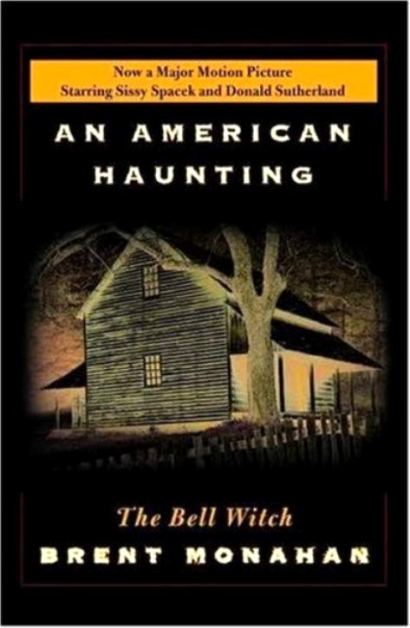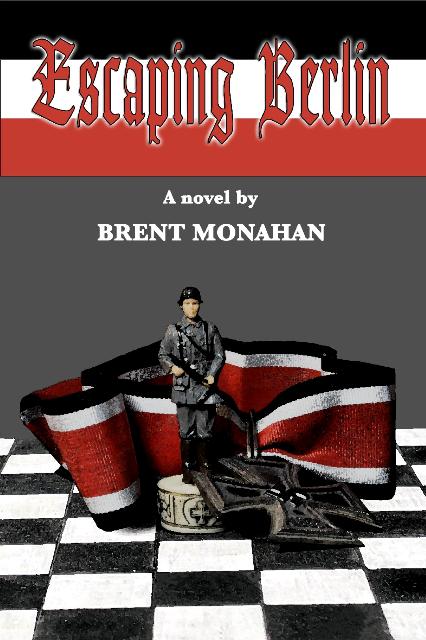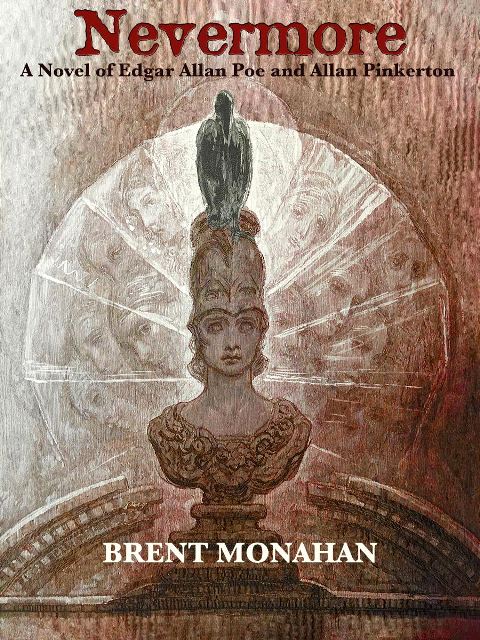
On this month's Special Page:
Our Media Director, Trish Wilson, scored an exclusive interview with best-selling author Brent Monahan
IN THE "SPECIAL PAGE" ARCHIVES:
Nerine Dorman
Laurie R. King
Joe Mynhardt
Luca Paris
John Skipp

Brent Monahan was first published in the so-called Horror genre in 1979, with the novel DeathBite. It became a film with Peter Fonda and Oliver Reed. Other novels included Satan's Serenade, The Uprising, the vampire reimagined with The Book of Common Dread and Blood of the Covenant, Illusions, and The Bell Witch/An American Haunting which was made into a film starring Donald Sutherland and Sissy Spacek. High-speed Shudder is an anthology of his short stories. He also writes period murder mysteries such as Nevermore and The Jekyl Island Club.
For decades, Brent Monahan has been writing what has interested him – and getting the attention of readers and critics alike. He has spent his life being fascinated by and passionate about questioning the world around him – and arriving at unique, thoughtful, insightful and, quite often, spear-tip pointedly amusing answers that find their expression in his many novels. In this interview, we discuss his books An American Haunting: The Bell Witch and Nevermore: A Novel of Edgar Allan Poe and Allan Pinkerton.
AN INTERVIEW WITH BRENT MONAHAN
TRISH WILSON: How did you come to be interested in the Bell Witch? Could you briefly explain what it was?
BRENT MONAHAN: When I wrote dialogue for ABC-Daytime's "One Life to Live", I was good friends with the head writer. We shared a fascination with horror, the occult, and the supernatural. Upon his unfortunate and untimely death, he bequeathed me his 200+ book collection on these subjects. One work focused on poltergeist hauntings, one of the few supernatural phenomena I believe in. I read about the mystery of the Bell Witch, the only such happening that resulted in the death of a member of the family.
TRISH WILSON: Your book "An American Haunting: The Bell Witch" was made into a movie starring Sissy Spacek and Donald Sutherland. How much involvement did you have in the script and the making of the movie? What was it like to work on it?
BRENT MONAHAN: Low-budget films had previously been made about this pioneering-era Tennessee tale, but inabilities to explain the cause of the haunting or the reason for the father's death condemned them to failure. My book sold well (and is still in print after twenty years) and came to a Hollywood producer's attention. He promised to adhere faithfully to the book. That along with major motion picture production work and its great casting might have elevated "An American Haunting" into the pantheon of such other works of horror as "Turn of the Screw" and "The Exorcist". However, the temptation to twist events for sensational effect and to assault the viewers' ears with a deafening score lessened the film. I have a sweatshirt with the words "The film is not the book." This happens all too often. I co-developed with the producer/director a script that satisfied me and which he swore was "set in stone" two months before initial filming. Then the amateur cooks took turns messing with a solid recipe. Donald Sutherland, who is a savvy, very personable guy, feared that his negative role would adversely affect his career and insisted that his character's story be obscured. Sissy Spacek, playing the part of Betsy Bell's mother, wished to contribute more than her original lines. However, I generally convinced her to use her sub-textual acting prowess to communicate her character's drives. She also is a gem of a person.
The most ironic aspect of the movie was that it was called "An American Haunting" and was originally intended to be filmed at the Tennessee location of the original events. However, the producer was convinced that filming in Romania, with its newly-created film industry, could save two million dollars. Unfortunately, only a few years before this the country was communist, with the workers' attitude expressed as "You pretend to pay us; we pretend to work." Their lack of experience and hustle extended the shoot by two weeks and drove the cost back up by two million dollars. I did, however, get to see much of Romania, have my own driver and limo, and hobnob with film stars. "An American Haunting" is the subtitle of the novel. We didn't want the movie confused with the execrable "The Blair Witch Project". I can't be too unhappy with results. The week of its release, its box office take was #2, only surpassed by "Mission: Impossible".
TRISH WILSON: What are some of the various theories behind the haunting of the Bell Witch?
BRENT MONAHAN: Major among the early theories was that John Bell, the patriarch, had rented out some of his slaves to his neighbor Kate Batts, whose husband had been incapacitated by a falling tree. The rates were unfairly high, and John had trees cut and sold from Kate's property to pay the shortfall. For this, he was banned from his church, and Kate put a curse upon him and his family. The appearance of the poltergeist, was said to be a result of that curse. My findings are much different from that explanation.
TRISH WILSON: How did you come to your own conclusions on the case as described in the book?
BRENT MONAHAN: I did exhaustive research, using the publication of a Bell son and of a local woman named Ingram. I scoured Tennessean book shops for histories of that period and learned more about the Bells, Battses, and other neighbors. I visited Adams, Tennessee, the locale of the story, explored the farm and interviewed the current owner. I created a time line of Bell family happenings and studied the personalities of the players. Then I pieced together facts and realized that, through the lens of twentieth century psychology, the many clues suggested a very frightening explanation.
TRISH WILSON: You have written another well-researched novel, called "Nevermore". How did you come to be interested in Edgar Allan Poe, especially his death? Poe was found on a bench outside Gunner's Hall, a drinking establishment. He was taken to hospital and died shortly thereafter. What about the mystery behind Poe's death fascinated you so much?
BRENT MONAHAN: Whoever loves early American authors must become a fan of Poe. He remains one of the most exquisite purveyors of le mot juste and of mood creation. Secondly, who has written better stories of horror than "The Pit and the Pendulum," "The Cask of Amontillado," "The Masque of the Red Death," "The Tell-tale Heart," or "The Fall of the House of Usher"? I also became interested in his monstrous ego and self-destructive nature, like a latter-day Norman Mailer. As to his death, when he disappeared for three days shortly before his death, where was he in Baltimore? How did a man who prided himself on his appearance end up wearing shabby clothing a size too small? Who was this "Reynolds" he muttered about in his dying inchoate state? When he lived in New York City, merely by reading facts of a murder in the city newspapers, Poe actually solved how and where the murder occurred and who did it. Similarly, without inventing any conveniences, I have developed a plausible solution.
TRISH WILSON: How did you come to bring together Allan Pinkerton and Edgar Allan Poe? What was it about the characters that drew you to them?
BRENT MONAHAN: Interestingly, Poe and Pinkerton share the uncommonly-spelled name "Allan." They were contemporaries. Pinkerton became the first famous detective in America. Poe essentially invented the profession of detective with the "ratiocinating machine" C. Auguste Dupin in his short story "Murders in the Rue Morgue." How much fun to have Pinkerton solve Poe's murder as a spectacular means to open his detective agency? Even better, to have the Scottish immigrant, who had no time for the frivolities of enjoying fiction, come to appreciate good literature as he got to know Poe, solve the crime, see that the murderer is punished, but refuse to sully Poe's reputation by capitalizing with public revelation?
TRISH WILSON: Did you have mentors early in your career who helped you? If you did, who were they? What kind of help did they give you? I've noticed some writers have had mentors and they've maintained professional relationships and even friendships with them.
BRENT MONAHAN: Richard Updike and Isabelle Behr were two excellent English teachers during my public school years. They insisted that their students know the essentials of good writing, such as "You must follow the CUBE rule: Clarity, Unity, and Brevity equal Excellence." We were encouraged to write newspaper-type articles and short stories. I was lucky enough right after selling my first novel to hire the services of Laura Bergquist Knebel, wife of "Seven Days In May" author Fletcher Knebel and editor/author for Look Magazine, to peruse the manuscript. She not only tore it apart but also put it back together beautifully. Via many examples, she taught me the syntactical logic of good sentence structure. She educated me on avoiding "empty calorie words." It was humbling. I was also lucky to be assigned two Princeton-University-educated editors, Jared Kieling and Gordon Van Gelder, while I was a St. Martin's Press author. They went far beyond word editing to question character motivations and address how differences in intellect, education, and experience could be indirectly shown via dialogue. And yes, both these gentlemen remain friends.
TRISH WILSON: What advice do you have for aspiring writers who wish to write creative non-fiction?
BRENT MONAHAN: If you would write well, read well. This is true of both fiction and non-fiction. Choose respected authors; read their work once for pleasure and again to analyze how they so engaged you. You can turn to Tom Wolfe and Craig Vetter, but my favorite creative non-fiction writer is the brilliant John McPhee, who I happen to know. When you personally attempt writing, do it on a regular basis. Try to write every day and set aside a time and place for this. McPhee rented rooms above Nassau Street in Princeton rather than risk the temptations of home distraction. He would stare down at traffic for long minutes and sharpen a host of pencils, but eventually he got down to work. The excuse of "I know what I want to say, but I can't figure out how to say it" is bullshit. Putting something "on paper" is absolutely required, because even if it's garbage, you can look at it the next day and say, "This is garbage because…." Then you can fix it. Finally, when you've written and edited, put it in a drawer for at least a week. During the process of creation, you get so involved with the work that you can't see the forest for the trees. What you thought you had written shows its weaknesses.
TRISH WILSON: Please leave your website and social media links. Also, any more upcoming projects readers may look forward to?
BRENT MONAHAN: My web site, www.brentmonahan.com, will be transferred to SquareSpace by the time this issue of The Horror Zine appears. Providing questions are not invasive and address the creative side of my life, you can use the Contact Me button to reach me. My latest project is a novel I have ruminated on, researched, and written and rewritten for more than fifty years. It is called "Escaping Berlin". On the surface, it is a detective thriller that takes place in Berlin in the final days of World War II. However, the novel has almost as many layers as Moby Dick, focusing on important existential questions as "Is there ever a time or place when sacrificing morality for survival is justified?" and "How could the German people, who considered themselves the most advanced and cultured in the early twentieth century, allow Hitler to lead them not only to attempt Master Race domination but also become his willing executioners via mechanized genocide?" While "Escaping Berlin" has no ghosts, vampires, or poltergeists, it is a far more disturbing example of horror. Douglas E. Winter, lawyer, author, and active member of Horror Writers of America, has brilliantly written "Horror is not a genre, like the mystery or science fiction or the western. It is not a kind of fiction meant to be confined to the ghetto of a special shelf in libraries or book stores…. Horror is an emotion."
Escaping Berlin was published on December 1, 2022.


